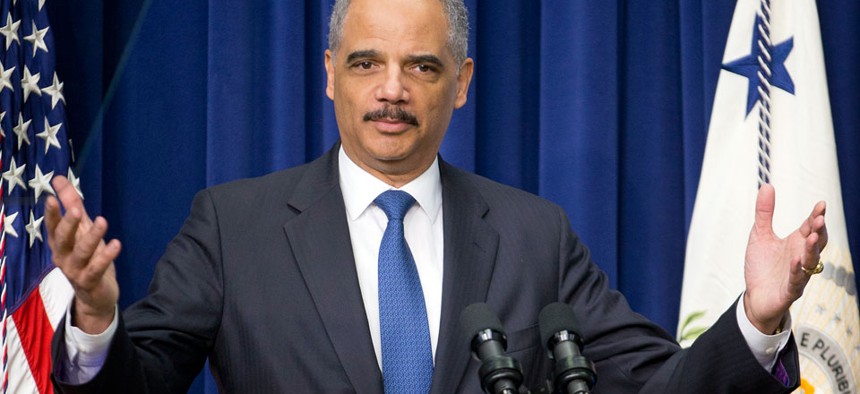Feds Dismiss Google's Fears Over FBI’s Hacking Power

Attorney General Eric Holder Pablo Martinez Monsivais/AP File Photo
Google’s claim that the expansion of search warrant authority is a “monumental” constitutional threat is grounded in inaccuracies, the Justice Department said.
The Justice Department is firing back at Google for asserting that a plan to expand the FBI's hacking authority represents a "monumental" constitutional concern.
In a stinging rebuttal submitted this week, DOJ castigated Google, claiming that the search giant is misreading its proposal that would give judges more flexibility in how they can approve search warrants for electronic data.
"The criticisms appear to misunderstand what is at stake in the proposal," Deputy Assistant Attorney General David Bitkower wrote. "As the department has repeatedly emphasized, the proposal would not authorize the government to undertake any search or seizure or use any remote search technique not already permitted under current law."
Google's concerns, Bitkower concluded, are "premised on incorrect understandings of what the proposal would actually authorize or of current law."
Bitkower's reply is an attempt to answer concerns Google raised this month about the government's little-noticed attempt to change an arcane federal rule by petitioning a judicial advisory panel. Known as Rule 41 of the federal rules of criminal procedure, the provision generally allows judges to grant search warrants only within the geographic bounds of their judicial district.
But last year, the Justice Department began a process to amend that rule to allow judges to approve warrants for a computer located outside their jurisdictions, or in situations where officials are not certain where data or a network is located.
The government has said the change is merely a tweak of protocol, necessary to bring federal rules up to date with the digital realities of the 21st century. Privacy and civil-liberties advocates, such as the American Civil Liberties Union, have roundly condemned the plan as a threat to the Fourth Amendment's protection against unreasonable search and seizures.
Google agrees with those concerns, and this month became the only tech giant to weigh in publicly on the disagreement. The rule change "raises a number of monumental and highly complex constitutional, legal, and geopolitical concerns that should be left to Congress to decide," wrote Richard Salgado, Google's director for law enforcement and information security.
DOJ's wording could allow remote searches on the data of millions of Americans at once, Google argued, suggesting the plan lacked legal authority.
But Google's assertions are grounded in conjecture and a sequence of misinterpretations, Bitkower said. He blasted the assertion that law enforcement cannot adopt "new investigative techniques absent congressional approval" as "incorrect on two counts" because remote searches are not new and because warrants for remote searches are issued under the federal rules in question.
Bitkower noted that Congress has "never specifically authorized video surveillance warrants" to reject Google's line of thinking. He chastised Google throughout his memo, at one point saying the search giant's "logic does not follow."
The rules, Bitkower argues are not vague, would not conflict with the Privacy Protection Act, which protects journalists from certain government searches, and would allow targeting of so-called botnets only when they are suspected of malicious activity.
"Google objects to the scope of botnet warrants, nothing that they could authorize millions of computers," Bitkower writes. "But the large scope of botnet warrants is not a function of Rule 41, it is a function of the scope of botnet crime. Botnets may affects millions of people. And importantly, Google offers no solution for obtaining a warrant in such cases. It would be odd to adopt a 'too big to investigate' rule in response to vast criminal activity."
Google did not respond to a request for comment regarding the Justice Department's criticisms.
The new round of comments pointedly directed at Google and others is unusual, given that DOJ had already submitted counterarguments to the concerns that had been raised.
But Bitkower presented his response at the request of the judicial advisory panel, which is expected to make a decision on Rule 41 in the coming months—though the amendment faces additional obstacles before legal adoption. That process includes a Supreme Court review and an audit by Congress, which would have seven months to act on the proposal.
Failure to enact legislation to "reject, modify, or defer the rules," however, would result in the change automatically taking effect, according to policies that govern U.S. courts.
NEXT STORY: Preparations for shutdown proceed apace






